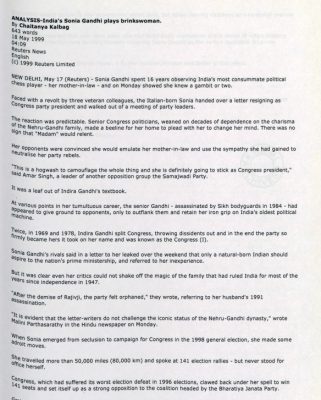ANALYSIS-India’s Sonia Gandhi plays brinkswoman
[Reuters]
Published date: 18th May 1999
18 May 1999
Reuters News
English
(c) 1999 Reuters Limited
NEW DELHI, May 17 (Reuters) – Sonia Gandhi spent 16 years observing India’s most consummate political chess player – her mother-in-law – and on Monday showed she knew a gambit or two.
Faced with a revolt by three veteran colleagues, the Italian-born Sonia handed over a letter resigning as Congress party president and walked out of a meeting of party leaders.
The reaction was predictable. Senior Congress politicians, weaned on decades of dependence on the charisma of the Nehru-Gandhi family, made a beeline for her home to plead with her to change her mind. There was no sign that “Madam” would relent.
Her opponents were convinced she would emulate her mother-in-law and use the sympathy she had gained to neutralise her party rebels.
This is a hogwash to camouflage the whole thing and she is definitely going to stick as Congress president,” said Amar Singh, a leader of another opposition group the Samajwadi Party.
It was a leaf out of Indira Gandhi’s textbook.
At various points in her tumultuous career, the senior Gandhi – assassinated by Sikh bodyguards in 1984 – had appeared to give ground to opponents, only to outflank them and retain her iron grip on India’s oldest political machine.
Twice, In 1969 and 1978, Indira Gandhi split Congress, throwing dissidents out and in the end the party so firmly became hers it took on her name and was known as the Congress (1).
Sonia Gandhi’s rivals said in a letter to her leaked over the weekend that only a natural-born Indian should aspire to the nation’s prime ministership, and referred to her inexperience.
But it was clear even her critics could not shake off the magic of the family that had ruled India for most of the years since independence in 1947.
After the demise of Rajivji, the party felt orphaned,” they wrote, referring to her husband’s 1991 assassination.
It is evident that the letter-writers do not challenge the iconic status of the Nehru-Gandhi dynasty,” wrote Malini Parthasarathy In the Hindu newspaper on Monday,
When Sonia emerged from seclusion to campaign for Congress in the 1998 general election, she made some adroit moves.
She travelled more than 50,000 miles (80,000 km) and spoke at 141 election rallies – but never stood for office herself.
congress, which had suffered its worst election defeat in 1996 elections, clawed back under her spell to win 241 seats and set itself up as a strong opposition to the coalition headed by the Bharatiya Janata Party.
Grateful Congress leaders catapulted Sonia to the head of the 113-year-old party, and their faith was rewarded when Congress won crushing victories in three provincial polls in November.
Despite the ambitions of her lieutenants, the 52-year-old former housewife held back from making a grab for power.
That restraint ended two months ago when she orchestrated moves to topple Prime Minister Atal Behari Vajpayee, and made her first key blunder.
She rashly vowed to form a new government within days, but failed, leaving Vajpayee as a caretaker premier Newspapers reported that with close aides who had fared badly themselves at the hands of voters shaping policy, the momentum was building towards declaring Sonia Gandhi as the party’s candidate for prime minister.
That clearly rankled with Sharad Pawar, a former defence minister and leader of the rebels.
Pawar was chiefly responsible for Congress winning 33 seats in the 1998 elections in the western state of Maharashtra, nearly one-quarter of the party’s total in parliament.
Never loathe to make his own prime ministerial ambitions clear, Pawar was appeased by being named floor leader of the party in parliament. But that was apparently not enough.






